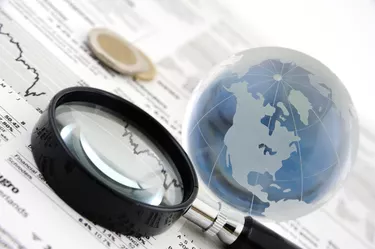
One indicator used to determine a country's economic health is the balance of payments. Numerous factors can directly and indirectly affect a country's current balance of payments, including interest rates, exchange rates and the country's past and current fiscal policy. Fiscal policy alone will not dictate a country's current balance of payments status; however, it can affect this economic measure.
Fiscal Policy
Video of the Day
Fiscal policy refers to how a government uses its ability to alter spending and raise or lower taxes in an effort to influence its overall economy. In the United States, both the Congress and the president can implement and affect fiscal policies by legislation or executive orders. When the economy is healthy, the government generally uses restraint with its fiscal policy. When the economy is not healthy, the government tends to exercise a stimulus approach.
Video of the Day
While a number of other factors determine the balance of payments, a fiscal policy of restraint will generally cause both the government and consumers to slow its spending.
Balance of Payments
The balance of payments is the term used to refer to a country's international transactions from an accounting perspective. Just as a personal or business ledger keeps track of spending and income, the balance of payments is an accounting of a country's international income and expenses.
Cash that flows out of the country is marked as a debit on the balance of payments, while cash flowing in is considered a credit. When credits are greater than debits, the country has a positive balance of payments. Conversely, when debits are greater than credits, the country has a negative balance of payments.
Effect of Fiscal Restraint
A policy of fiscal restraint is typically exercised when a country's economy is operating at full capacity. In other words, the economy is apparently healthy, employment is near capacity and inflation begins to set in as a result. The government may respond to rising inflation by increasing taxes or reducing spending.
While a number of other factors determine the balance of payments, a fiscal policy of restraint will generally cause both the government and consumers to slow its spending. A general decrease in overall spending can cause the cash flow leaving the country to decrease as consumers and the government both purchase less. This will decrease the debit side of the balance of payments.
Effect of Fiscal Stimulus
When the economy is sluggish and unemployment is rising, a stimulus fiscal policy may be used to jump-start the economy. By lowering taxes and increasing government spending, demand increases and jobs are created.
When more people are employed and discretionary spending increases as a result of decreased taxes, consumers purchase more goods. As a result, the cash flow leaving the country may increase. This increases the debit side of the balance of payments.